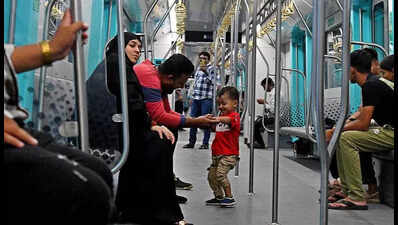- News
- City News
- mumbai News
- 8,000 passengers use underground metro on day 1, traffic likely to surge as morning peak hour services start today
Trending
8,000 passengers use underground metro on day 1, traffic likely to surge as morning peak hour services start today

Trains on the Aqua line, as it is known, began running after non-peak hours at 11 am, but the response was encouraging. Many who were excited about the prospect of travelling on the underground line, arrived at stations even before the Metro trains started.

Normal services will start from Tuesday. Timings will be 6.30am to 10.30pm Monday to Saturday, and 8.30am to 10.30pm on Sundays.
The presence of office-goers at the BKC station in the evening was significant. Several opted for the Metro ride instead of the road journey to Bandra station. People waited in long queues at the booking counter, sometimes up to 15 minutes, to get a ticket. A Gokuldham resident working in BKC said, "I don't mind waiting as I can reach Aarey station directly and then go straight home."
"I usually take a cab or train to BKC, but this Metro is far more convenient. It saved me time, and I didn't have to deal with the usual road traffic," said Rajesh Kumar, a commuter from Marol. A BKC employee, who stays in Sahar, Jindal P, said, "I usually take a shared rickshaw to Andheri from where I come to Bandra, and then the company bus takes me to the office. It takes almost 70 minutes, but due to the Metro, I can reach the office in 30 to 40 minutes."
The underground infrastructure and amenities were appreciated by passengers. "It's impressive how smoothly the trains are running, especially on the first day. The stations are well-designed, and the trains are clean and punctual," said Ashwini Naik, a student who boarded from BKC.
However, not all reviews were positive. Many expressed their disappointment over lack of mobile network and internet connectivity in the underground sections. "It's a great service, but not being able to use my phone during the ride is a problem, especially for those who need to stay connected for work," said Neha Gupta, who commutes to BKC daily for her job.
A group of men carrying luggage planned to head directly to the T2 airport to catch a flight. One said the underground train journey was "speedy," but observed that the halts at some platforms were "for a long time." Some passengers, especially the elderly, expressed concerns about the absence of escalators at certain gates, such as the one at Marol to enter the station below. Others pointed out that toilets were closed at locations like the T2 airport station. "The lifts were not operational at one of the stations," said an elderly man travelling alone. Some people also complained of safety door glitches and entry-exit points being closed at a few stations.
Upon exiting, many passengers discovered a lack of last-mile connectivity at various locations. Shrikant Surve, a passenger who had come with his family for a joy ride, said, "We have to walk a distance before getting access to autos or buses. Maybe this is just the beginning of service and last-mile connectivity should improve outside all Metro stations for seamless travel."
Despite the initial challenges, the Metro service has offered a more efficient and comfortable alternative for commuters who previously depended on road transport. At present, tickets (costing Rs 10-50) can be bought through the metroconnect3 app or by paying cash at counters or automated ticket vending machines.
End of Article
FOLLOW US ON SOCIAL MEDIA










